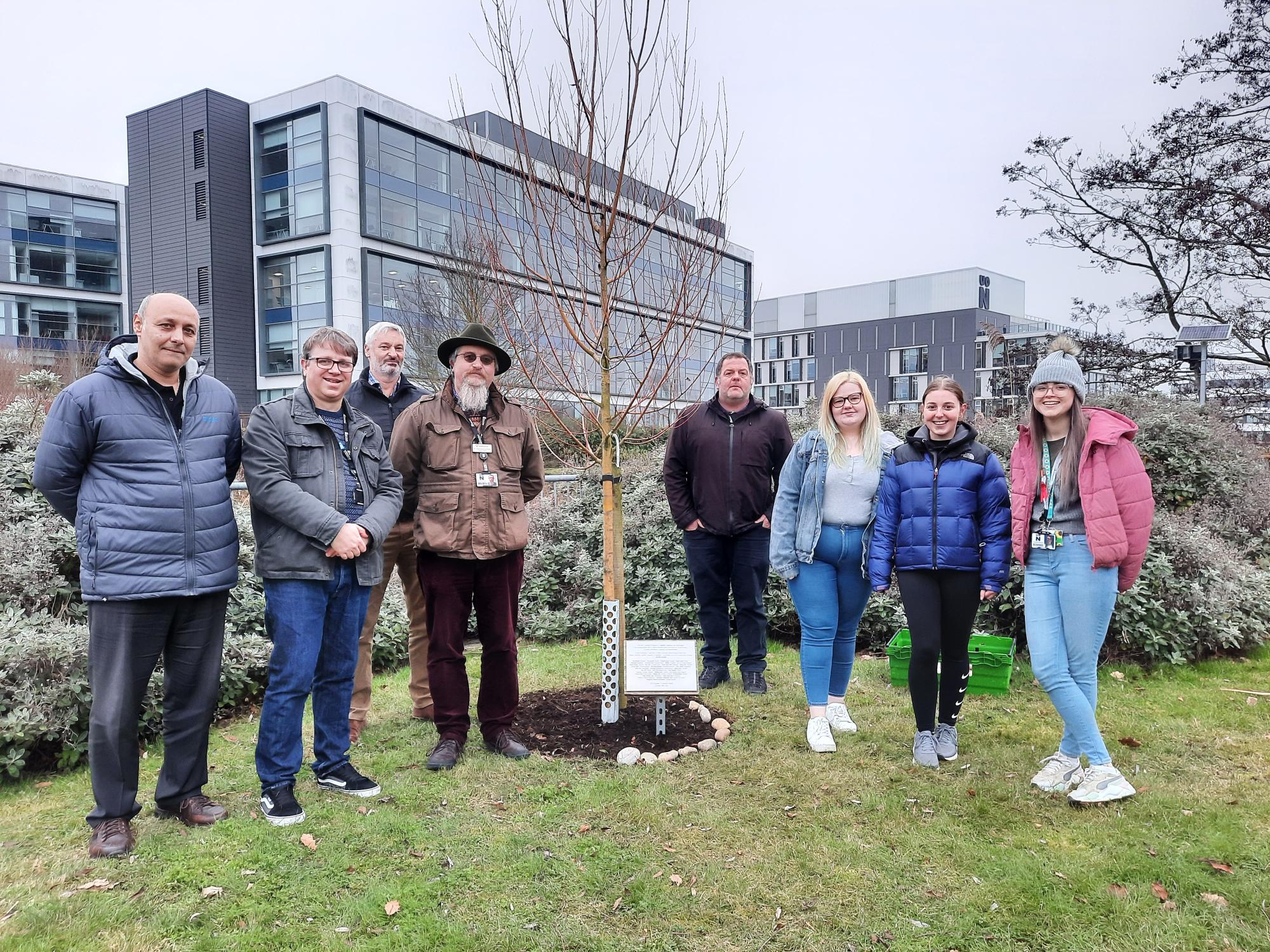Memorial tree plaque relocated as part of Holocaust Memorial Day event
Date 25.01.2022

Students and colleagues from the University of Northampton gathered on campus for a dedication service held to mark Holocaust Memorial Day.
The ceremony was to dedicate the memorial tree plaque, which has been relocated from the University’s former Park Campus to under a new willow tree in Waterside’s memorial garden.
The willow, which stands on the bank of the River Nene, was planted last year by the Student’s Union History Society. The plaque dates back to October 2004, when it was installed under the former memorial tree at Park Campus.
The ceremony, which took place on Tuesday 25 January, also saw University representatives lay commemorative stones under the tree, as has been the tradition for previous Holocaust Memorial Day events at the institution.
The service was led by University Chaplain, Stuart Mousir-Harrison, who recited the following dedication:
“In 2004 University College Northampton, the forerunner of this institution, installed this plaque as part of Equality and Diversity Week, to the memory of Anne Frank and Stephen Lawrence: two young people, exemplars to different generations of the effects of evil and discrimination, remembering those whose deaths have reverberated down the years to spur fresh action to fight hatred, discrimination and injustice.
For many years on Park Campus the plaque was associated with a tree – not always the same one, it must be admitted. Over the course of time the two together served as a focus for memory, symbols acknowledging the need for, and desire to, change and challenge the injustices and sorrows of our society and world. They were witnesses to bereavement and loss, to remembrance of the conflict of world-spanning wars, and our remembrance of the evils of Holocaust and genocide.
Today, in the context of our events for Holocaust Memorial Day 2022, we are gathered to reaffirm our active support for the values of tolerance, humanity and understanding, to recognise the evils of both our past and our present, in which society has so often been complicit, and to commit ourselves afresh to oppose systemic and personal evil and prejudice. We stand for human rights, and for good disagreement, irrespective of our differences.
This we affirm today in the name of all that we hold sacred, dear and holy.
But, of course, words are easy…
As part of this affirmation, a physical acknowledgement, turning words into actions, I invite each person here to take a stone. To feel the heft, the weight, the solidity. A stone represents one of the earliest tools, one of the earliest building materials, and one of the earliest and most basic weapons to deploy against another. As part of our affirmation today I invite you to set down your stone, to lay aside the potential weapon, and leave empty-handed and open-hearted, ready to make your own positive difference in our world.
May it always be so.”
Holocaust Memorial Day falls on Wednesday 26 January, when the History Society will welcome a guest speaker to campus. The speaker, from the ‘45 Aid Society, will talk about his family and their experiences during the Holocaust. The talk will also include a candle lighting ceremony. It takes place at 2pm in room LH121.
History Society member and student, Ella Phelps, said: “Holocaust Memorial Day is a time of reflection and memorial of all those victims of both the Holocaust and all the other genocides that have occurred since. The day falls on January 27, which has a particular importance as it was the day the liberation of Auschwitz and Auschwitz Birkenau occurred, in 1945. That marked the start of all the labour and concentration camps being liberated. Holocaust Memorial Day is witnessed across the world with many trying to make sure that these atrocities will not be forgotten and therefore should not happen again.
“Sir Winston Churchill once said ‘Those who fail to learn from history are doomed to repeat it’ and this sentiment is commonly held by Holocaust survivors, with many of them choosing to relive their experiences in order to share with others to make sure that these atrocities don’t happen again.”